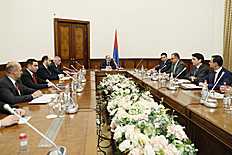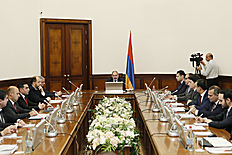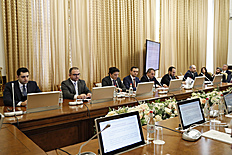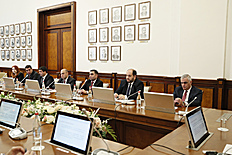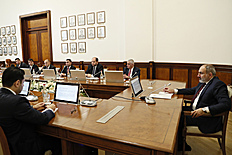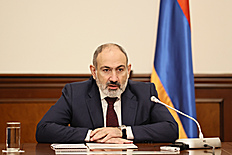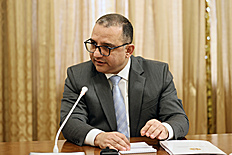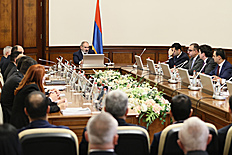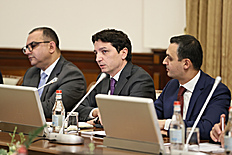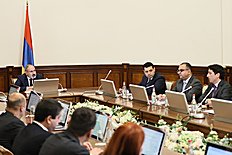Press releases
Activity report 2022 of the Ministry of Finance presented to the Prime Minister
more 7 photos
Prime Minister Nikol Pashinyan visited the Ministry of Finance to participate in the discussion of the activity report of the ministry for 2022. Deputy Prime Ministers Mher Grigoryan and Hambardzum Matevosyan, Chief of Staff of the Prime Minister Arayik Harutyunyan, Head of the State Supervision Service Romanos Petrosyan, officials of the Prime Minister's Office, the leading staff of the Ministry of Finance, and other officials participated in the consultation.
"Dear colleagues, as we have agreed, we are starting summing up the works of ministries in 2022, and we are starting with the Ministry of Finance. Of course, there is still quite a lot of time before the end of the year, but we believe that taking into account the specifics of the Ministry of Finance's activities, we can make a certain summary of what has been done," the Prime Minister said at the beginning of the discussion.
Minister of Finance Tigran Khachatryan briefly presented the current and upcoming plans of the Ministry, then handed over the floor to the Deputy Minister of Finance and the Secretary General of the ministry.
Deputy Minister Vahe Hovhannisyan reported on the work done in the direction of improving the budget system and developing international cooperation. the existing strategic documents have been inventoried, the policy framework defined by them has been mapped. In the process of budget planning, the MTEF process was in the center of attention, the concept and guidelines for the evaluation of budgetary programs were developed, a pilot evaluation of a number of budgetary programs was carried out, and the evaluation methodology was revised. In the framework of the upcoming programs, it is planned to revise the methodological instructions for the submission of MTEF and annual budget applications, to carry out simplification of processes, harmonization of budgetary programs, establishment of the Financial Budgetary Control Department of the Ministry of Finance as a monitoring and evaluation unit, introduction of participatory budgeting, etc. In the field of international cooperation, preparations were made for 4 credit programs of budgetary support in the amount of 200 million USD and 150 million euros, with the World Bank, the Asian Development Bank, the French Development Agency and the International Development Fund of OPEC, and the signing of 2 credit agreements in the amount of 49.1 million euros with the WB, visits of delegations of high-ranking dofficials of the Ministry of Finance to Russia, Georgia, Iran, etc, took place for the purpose of exchange of experience.
Deputy Minister Arman Poghosyan noted that in the field of fiscal policy, work has been done in the direction of forecasting tax revenues and assessment of potential, improvement of the royalty system, the legislative package for the introduction of the universal income declaration system of individuals was approved at the Cabinet meeting and submitted to the National Assembly. The legislative package for the improvement of the preferential system of taxation of micro-enterprises has been submitted to the National Assembly for discussion, steps have been taken to strengthen the legal foundations for the organization of reliable construction, to review the taxation system of the gaming industry, to improve the quality of auditing services, and to form a public control board in the field of accounting and auditing. Within the framework of upcoming programs, it is planned to revise alternative taxation systems, organize Inspections of audit organizations with the involvement of independent experts, etc.
Deputy Minister Armen Hayrapetyan presented the measures implemented in the field of macroeconomic policy and debt stability. the toolkit for fiscal policy analysis and forecasts has been improved, work with international partners continued, a balanced and smooth expansion of the debt in dram was implemented and is planned to continue, the "Stabilization Account" management system has been introduced, which will allow support for the sustainable implementation of fiscal policy, counteract economic shocks. Among the upcoming projects will be the projects aimed to improve tax revenue forecasting and debt management systems.
Deputy Minister Avag Avanesyan referred to procurement policy and fiscal risk management. It was noted that works aimed at effective balance of speed and quality of the procurement system have been carried out. In particular, the appeals system has been transferred to the court, a new procedure for construction works in emergency situations has been established, the procedure for purchasing from one person has been reformed, etc. 270 specialists have passed capacity building trainings, business processes of the digital system has been optimized, and a vision-forming concept for the development of the procurement system was adopted for the purpose of predictability. Improvement of the digital system, construction risk management, capacity building, development of analytical tools are planned in the framework of upcoming programs. As for fiscal risk management, the department in charge has been reorganized, and the primary directions of fiscal risks have been defined. It is planned to continue the development of analytical capabilities and tools, assessment of long-term fiscal sustainability, etc.
General Secretary of the Finance Ministry Karen Sargsyan reported that within the framework of management reforms, structural changes of professional departments have been implemented, business processes of the financial management information system have been inventoried, and external trainings and discussions were organized. Within the framework of the upcoming programs, optimization and digitization of functions and the development of the competences of the staff will be continued.
The Prime Minister emphasized the work done and drew the attention of the managing staff of the Finance Ministry to a number of topics and reforms.
Nikol Pashinyan, in particular, referred to the subsidy programs that are implemented with Government-community co-financing and noted that the process of forming community budgets is important for the effectiveness of the programs. According to the Prime Minister, it should be clearly conceivable, calculable, and it is necessary to continuously raise the level of institutionalization of this process with interdepartmental cooperation. In this context, the Head of the Government emphasized the improvement of the program funding mechanism.
Nikol Pashinyan emphasized the reforms launched in a number of directions of the fiscal policy, including the introduction of the universal income declaration system of individuals, and instructed to carry out proper public awareness raising campaign. The Prime Minister noted that targeted public communication will contribute to the strengthening of the Government-public relationship and increasing the accountability of the tax policy.
The Head of the Government referred to the other reported topics as well: public debt management, efficiency of credit programs, tax revenues, procurement process, professional capacity development, etc.
